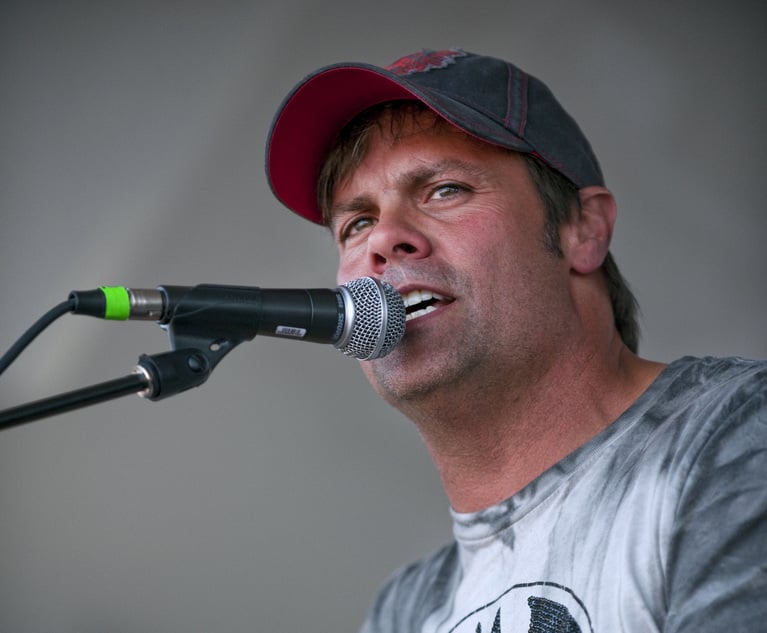Three Things to Watch For During the Rollout of Sports Betting
As sports betting rolls out, there are some issues that could bring complications to this rosy scenario.
May 15, 2018 at 06:31 PM
6 minute read
 Photo: Shutterstock
Photo: Shutterstock Long before Monday's U.S. Supreme Court ruling overturned the Professional and Amateur Sports Protection Act, wheels were turning to roll out sports wagering in New Jersey.
Although years of setbacks faced New Jersey's plan to legalize sports wagering, despite the efforts of its leading proponent, former Gov. Chris Christie, state officials and companies in the gaming industry continued to lay groundwork for the day when gambling on college and professional sports events would be legal.
Operators of the Monmouth Park racetrack in Oceanport, New Jersey, have announced that sports betting is set to begin on Memorial Day there. What's more, some multinational gaming companies have obtained or applied for licenses to become sports betting operators in New Jersey, according to lawyers familiar with the industry. And soon after the Supreme Court announced its decision Monday in Murphy v. National Collegiate Athletic Association, bills were introduced in the Senate and General Assembly detailing taxation and regulatory schemes for sports wagering.
State officials are hopeful that allowing wagers on professional and college sporting events will bring new life to Atlantic City casinos and to racing tracks, in addition to the funds they expect it to add to state coffers. But as sports betting rolls out, there are some issues that could bring complications to this rosy scenario.
Will the federal government attempt to regain authority over regulation of sports wagering?
After the Supreme Court announced its Murphy ruling on Monday, U.S. Sen. Orrin Hatch, R-Utah, said he would introduce legislation to assert federal control over sports betting. Hatch, one of the original sponsors of PASPA in 1992, the act overturned by the Supreme Court, said the need for a consistent, nationwide regulatory scheme was made more obvious by the rise in internet sports wagering.
“We cannot allow this practice to proliferate amid uneven enforcement and a patchwork race to the regulatory bottom. At stake here is the very integrity of sports,” Hatch said in a statement.
And the National Football League and National Basketball League both announced Monday that they favor regulation of sports wagering on the federal level.
The Supreme Court ruling in Murphy said states were free to regulate sports wagering as long as the federal government did not do so.
Enactment of federal regulations on sports betting appears unlikely, said Michael Sklar, who practices gaming law at Levine, Staller, Sklar, Chan & Brown in Atlantic City, New Jersey.
“To get something done in Congress these days, I don't know that it's going to get done. Meantime, you have states that can proceed to regulate sports betting however they see fit,” he said.
Will New Jersey adopt sports wagering laws and decide on tax rates promptly and without too much difficulty?
Monmouth Park can open based on an existing state statute, which provides for no regulation at all, said gaming attorney Lloyd D. Levenson of Cooper Levenson in Atlantic City. The bill introduced Monday, S-2602, with Senate President Steve Sweeney as chief sponsor, calls for an 8 percent gross revenue tax on in-person sports wagering and a 12.5 percent tax on online sports bets. An additional tax of 1.25 percent would go to municipalities and counties that host sports wagering sites.
Sweeney's bill calls for the sports wagering oversight to come from the state Division of Gaming Enforcement, the same agency that supervises casino gambling, said Christopher Soriano, whose practice at Duane Morris in Cherry Hill, New Jersey, focuses on casino regulation. Soriano expects Sweeney's bill to pass “very soon.”
“I'm sure there's going to be some lobbying about what's in the bill but I don't think it will be any more contentious than any other gaming bill,” Soriano said.
Will professional leagues fight New Jersey for a chunk of the revenue from sports betting?
As states hone their tax and regulatory schemes for sports betting, the NBA and Major League Baseball have sought “integrity fees” of 1 percent of wagering revenues, purportedly to spend on battling match-fixing, and some states have complied, according to gaming attorneys and press accounts. But will New Jersey officials look kindly if the very sports leagues that battled its sports wagering proposals for years ask for a cut of the revenue? Gaming lawyers said the leagues have no legal basis to seek one.
“New Jersey didn't spend all this money defeating the leagues to turn around and say, 'Here's your piece of the action,'” Levenson said.
Litigation over sports leagues' desire for a share of New Jersey's sports wagering revenue is possible, said Soriano of Duane Morris.
“My expectation is that will shake out differently in different states. A number of New Jersey legislators are already on the record saying that they don't believe the sports leagues, having fought New Jersey so long, should receive a portion of the revenue,” Soriano said. And a recently enacted Pennsylvania sports wagering statute provided no cut to sports leagues, he said.
All in all, sports wagering is good news, according to gaming lawyers, who will see an uptick in work as the new industry gets established.
Levenson said companies making computers used to accept sports wagers would need legal representation when they get their equipment approved by New Jersey gaming authorities, and would continue to require representation “through their entire process of being licensed.”
“There's going to be a lot of work to get the industry up and running and complying with whatever regulatory scheme is ultimately adopted, with the caveat that if it turns out there's no regulatory scheme, there's less work,” said Sklar of Levine Staller.
“The legal work will involve ensuring that the casinos and race tracks are going to comply with whatever rules and regulations are ultimately going to be in place,” Sklar said.
Soriano said racetracks have high hopes that their share of sports wagering revenue will permit them to offer larger purses in their horse races, thereby drawing more bettors. He added that sports wagering would help all sorts of lawyers.
“Anytime you have a new industry like this, there will be more jobs, so there's more employment law opportunities. There's technology involved, so there are IP-type opportunities. And obviously, there's more work for gaming regulatory lawyers.”
This content has been archived. It is available through our partners, LexisNexis® and Bloomberg Law.
To view this content, please continue to their sites.
Not a Lexis Subscriber?
Subscribe Now
Not a Bloomberg Law Subscriber?
Subscribe Now
NOT FOR REPRINT
© 2025 ALM Global, LLC, All Rights Reserved. Request academic re-use from www.copyright.com. All other uses, submit a request to [email protected]. For more information visit Asset & Logo Licensing.
You Might Like
View All

Engine Manufacturer Escapes Suit Over NJ Helicopter Crash That Killed Country Music Star
3 minute read
Lack of Jurisdiction Dooms Child Sex Abuse Claim Against Archdiocese of Philadelphia, Says NJ Supreme Court
5 minute read
Trending Stories
- 1Mastering Litigation in New York’s Commercial Division Part V, Leave It to the Experts: Expert Discovery in the New York Commercial Division
- 2GOP-Led SEC Tightens Control Over Enforcement Investigations, Lawyers Say
- 3Transgender Care Fight Targets More Adults as Georgia, Other States Weigh Laws
- 4Roundup Special Master's Report Recommends Lead Counsel Get $0 in Common Benefit Fees
- 5Georgia Justices Urged to Revive Malpractice Suit Against Retired Barnes & Thornburg Atty
Who Got The Work
J. Brugh Lower of Gibbons has entered an appearance for industrial equipment supplier Devco Corporation in a pending trademark infringement lawsuit. The suit, accusing the defendant of selling knock-off Graco products, was filed Dec. 18 in New Jersey District Court by Rivkin Radler on behalf of Graco Inc. and Graco Minnesota. The case, assigned to U.S. District Judge Zahid N. Quraishi, is 3:24-cv-11294, Graco Inc. et al v. Devco Corporation.
Who Got The Work
Rebecca Maller-Stein and Kent A. Yalowitz of Arnold & Porter Kaye Scholer have entered their appearances for Hanaco Venture Capital and its executives, Lior Prosor and David Frankel, in a pending securities lawsuit. The action, filed on Dec. 24 in New York Southern District Court by Zell, Aron & Co. on behalf of Goldeneye Advisors, accuses the defendants of negligently and fraudulently managing the plaintiff's $1 million investment. The case, assigned to U.S. District Judge Vernon S. Broderick, is 1:24-cv-09918, Goldeneye Advisors, LLC v. Hanaco Venture Capital, Ltd. et al.
Who Got The Work
Attorneys from A&O Shearman has stepped in as defense counsel for Toronto-Dominion Bank and other defendants in a pending securities class action. The suit, filed Dec. 11 in New York Southern District Court by Bleichmar Fonti & Auld, accuses the defendants of concealing the bank's 'pervasive' deficiencies in regards to its compliance with the Bank Secrecy Act and the quality of its anti-money laundering controls. The case, assigned to U.S. District Judge Arun Subramanian, is 1:24-cv-09445, Gonzalez v. The Toronto-Dominion Bank et al.
Who Got The Work
Crown Castle International, a Pennsylvania company providing shared communications infrastructure, has turned to Luke D. Wolf of Gordon Rees Scully Mansukhani to fend off a pending breach-of-contract lawsuit. The court action, filed Nov. 25 in Michigan Eastern District Court by Hooper Hathaway PC on behalf of The Town Residences LLC, accuses Crown Castle of failing to transfer approximately $30,000 in utility payments from T-Mobile in breach of a roof-top lease and assignment agreement. The case, assigned to U.S. District Judge Susan K. Declercq, is 2:24-cv-13131, The Town Residences LLC v. T-Mobile US, Inc. et al.
Who Got The Work
Wilfred P. Coronato and Daniel M. Schwartz of McCarter & English have stepped in as defense counsel to Electrolux Home Products Inc. in a pending product liability lawsuit. The court action, filed Nov. 26 in New York Eastern District Court by Poulos Lopiccolo PC and Nagel Rice LLP on behalf of David Stern, alleges that the defendant's refrigerators’ drawers and shelving repeatedly break and fall apart within months after purchase. The case, assigned to U.S. District Judge Joan M. Azrack, is 2:24-cv-08204, Stern v. Electrolux Home Products, Inc.
Featured Firms
Law Offices of Gary Martin Hays & Associates, P.C.
(470) 294-1674
Law Offices of Mark E. Salomone
(857) 444-6468
Smith & Hassler
(713) 739-1250






